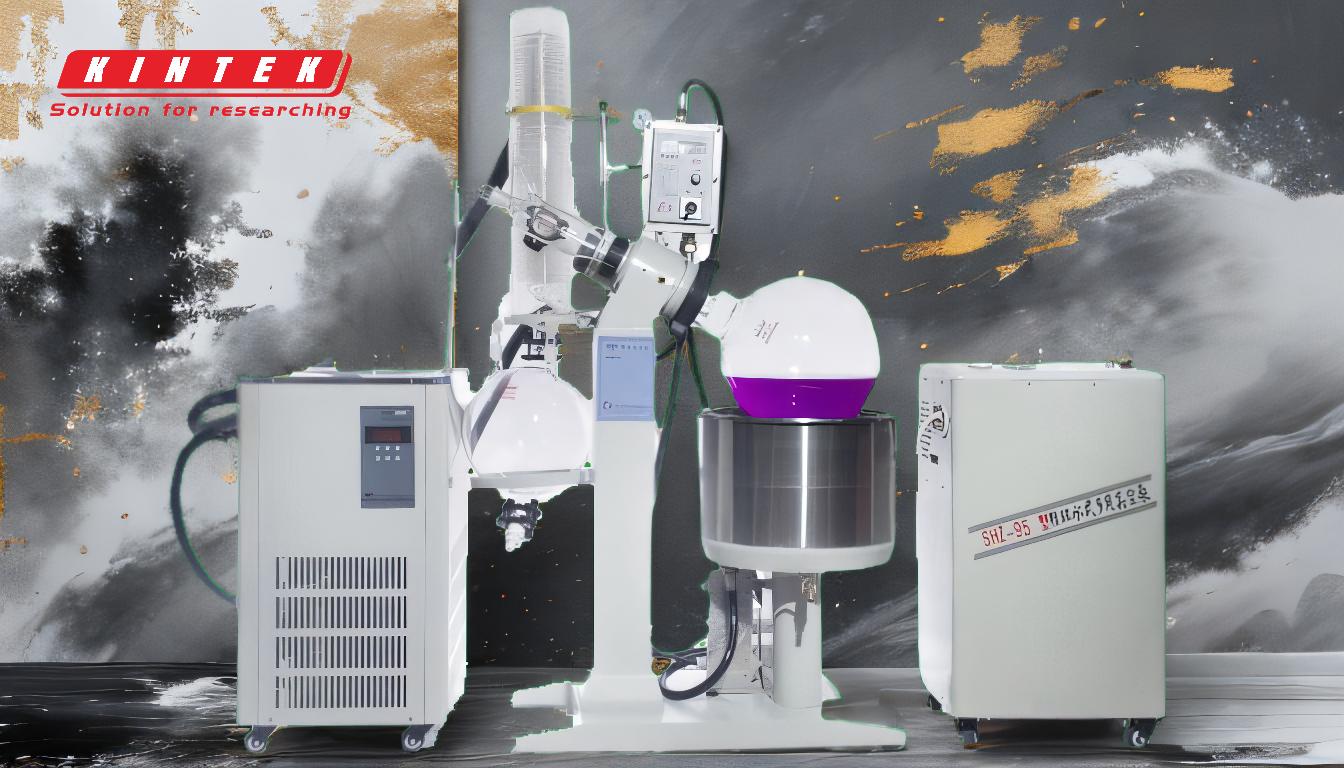A rotary evaporator, or rotovap, is a specialized piece of equipment widely used in molecular gastronomy for extracting, concentrating, and infusing flavors. It operates by gently evaporating solvents or liquids at low temperatures under reduced pressure, preserving delicate aromas and flavors that might otherwise be lost through traditional heating methods. In molecular gastronomy, rotovaps are primarily used to create concentrated fruit juices, distillates, and extracts, as well as to separate and isolate specific flavor compounds from mixtures of alcohol, herbs, and fruit. This technology allows chefs and culinary scientists to achieve precise flavor profiles and innovative culinary creations without compromising the integrity of the ingredients.
Key Points Explained:

-
Definition and Function of a Rotovap:
- A rotary evaporator (rotovap) is a device used to remove solvents or liquids from a mixture through evaporation under reduced pressure.
- It consists of a rotating flask, a heating bath, a condenser, and a vacuum pump, which work together to gently evaporate liquids at lower temperatures than traditional methods.
-
Applications in Molecular Gastronomy:
- Concentrating Flavors: Rotovaps are used to create highly concentrated fruit juices, coffee, and other liquids by removing water or other solvents. For example, chefs can extract the purest flavors from oranges or concentrate tomato sauce more efficiently.
- Extracting Aromas and Flavors: The device is ideal for isolating volatile aroma compounds from herbs, fruits, and alcohol without heating, preserving delicate flavors. For instance, it can extract basil aromas or desired flavors from a mixture of alcohol and herbs.
- Separating Components: Rotovaps can separate sugar, acid, color, and bitter compounds from aromas, alcohols, and small flavor molecules, enabling chefs to isolate specific elements for use in recipes.
-
Advantages Over Traditional Methods:
- Low-Temperature Processing: By operating under reduced pressure, rotovaps allow evaporation at lower temperatures, preventing heat-sensitive compounds from degrading.
- Precision and Control: Chefs can achieve precise control over the concentration and extraction process, resulting in consistent and high-quality flavor profiles.
- Versatility: Rotovaps can handle a wide range of ingredients, from fruits and herbs to alcoholic mixtures, making them a versatile tool in molecular gastronomy.
-
Examples of Use in Culinary Applications:
- Concentrated Fruit Juices: Rotovaps are used to create intensely flavored fruit juices, such as orange or apple, by removing excess water.
- Distillates and Extracts: They are employed to prepare distillates like brandy from wine or to extract flavors from herbs and spices.
- Innovative Recipes: Chefs use rotovaps to infuse unique flavors into dishes, such as creating basil-infused oils or alcohol-free extracts for cocktails.
-
Technical Considerations for Purchasers:
- Capacity and Size: Depending on the scale of operations, purchasers should consider the size of the rotovap, ranging from small benchtop units to larger industrial models.
- Material Compatibility: Ensure the device is compatible with the types of solvents and ingredients used in molecular gastronomy, such as alcohol and acidic solutions.
- Vacuum Pump Efficiency: A high-quality vacuum pump is essential for achieving the necessary reduced pressure for low-temperature evaporation.
- Ease of Cleaning and Maintenance: Look for models with detachable components and easy-to-clean surfaces to maintain hygiene and efficiency.
-
Future Trends and Innovations:
- As molecular gastronomy continues to evolve, rotovaps are likely to become more accessible and user-friendly, with features like automated controls and digital interfaces.
- Integration with other culinary technologies, such as sous-vide machines or centrifuges, may open up new possibilities for flavor extraction and recipe development.
In summary, rotovaps are indispensable tools in molecular gastronomy, enabling chefs to push the boundaries of flavor creation and culinary innovation. Their ability to extract, concentrate, and infuse flavors with precision and care makes them a valuable asset in modern kitchens.
Summary Table:
| Key Feature | Description |
|---|---|
| Low-Temperature Processing | Evaporates liquids at reduced pressure, preserving delicate aromas and flavors. |
| Precision and Control | Enables consistent and high-quality flavor profiles. |
| Versatility | Works with fruits, herbs, and alcoholic mixtures for diverse culinary uses. |
| Applications | Concentrates juices, extracts flavors, and isolates specific compounds. |
| Technical Considerations | Includes capacity, material compatibility, vacuum pump efficiency, and cleaning. |
Ready to elevate your culinary creations? Contact us today to explore rotary evaporators for your kitchen!












